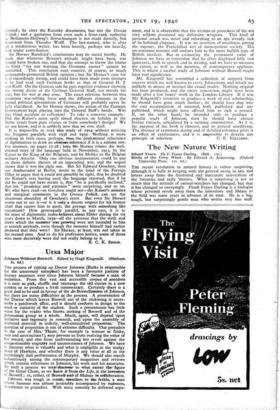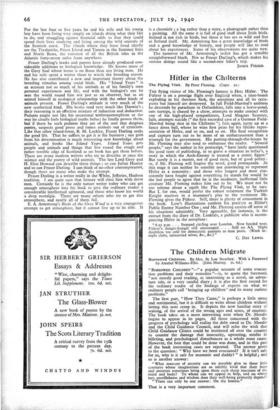The New Nature Writing
Island Years. By F. Fraser Darling. (Bell. 12s.) Birds of the Grey Wind. By Edward A. Armstrong. (Oxford University Press. 12s. 6d.) THE recent revolution in natural history is rather surprising, although it is fully in keeping with the general swing in arts and letters away from the frustrated and inaccurate materialism of the 'twenties and early 'thirties. What is surprising is not so much that the attitude of animal-watchers has changed, but that it has changed so sweepingly. Frank Fraser Darling is a biologist whose personal revolt away from the laboratory and library to the field was some years in advance of its time. He is a big, tough, but surprisingly gentle man who writes very fine stuff.
For the last four or five years he and his wife and his young boy have been living very simply on islands doing what they like to do, and struggling against financial odds so that they could spend their lives studying and living among the wild animals of the Scottish coast. The islands where they have lived chiefly are the Treshnishs, Priest Island and Tanera in the Summer Isles and North Rona, the remotest of all the British isles in the Atlantic forty-seven miles from anywhere.
Fraser Darling's books and papers have already produced con- siderable additions to biological knowledge. He knows more of the Grey Seal whose home is on Rona than any living man. He and his wife spent a winter there to watch the breeding season. He has also contributed a new and important theory about the breeding stimulus among social birds. His " Island Years " is an account not so much of his animals as of his family's own personal experiences and life, and with the biologist's eye he sees the world round him not just as an observer, but as an animal himself in ecological relationship with the other kinds of animals present. Fraser Darling's attitude is very much of the new synthetical kind. His books read very much like Darwin's ; their reasoning is an effective mixture of induction and deduction. Pedants might not like his occasional snthropomorphism or the way he clearly feels biological truths before he finally proves them, but if there be such pedants they are of the sort that despises poetry, suspects good prose and tames animals out of cynicism. Like that other island-lover, R. M. Lockley, Fraser Darling seeks the good life. That he suffers to get it is his business ; our gain from his determination is much interesting new knowledge about animals, and books like Island Years. Island Years gets people and animals and things that live round the rough and rather terrible edge of Scotland as no book has got them before. There are many modern writers who try to describe at once the science and the poetry of wild animals. The late Lord Grey and H. Eliot Howard can describe these things ; so can Julian Huxley and so can Fraser Darling. I can think of no other contemporaries, though there are many who make the attempt.
Fraser Darling is a writer really in the White, Jefferies, Hudson tradition. I am quite sure that history will class him with these men. Certainly he is the only nature writer today who can get enough atmosphere into his book to give the ordinary reader a considerable intellectual upheaval, and those who know his world a deep nostalgia. There are many others who try to get this atmosphere, and nearly all of them fail. E. A. Armstrong's Birds of the Grey Wind is a very courageous attempt to get atmosphere, but it cannot live up to its title. It
is a chronicle ; a log rather than a story, a photograph rather than a painting. All the same it is full of good stuff about Irish birds. Ireland is not rich in birds, but those it has are as wild and fine as Ireland itself. Mr. Armstrong has a great knowledge of birds and a good knowledge of history, and people will like to read about his experiences. Some of his observations are quite new.
The turnover of Mr. Armstrong's jacket has got a sensible straightforward blurb. Not so Fraser Darling's, which makes his serious doings sound like a second-rate hiker's trip.
JAMES FISHER.



































 Previous page
Previous page